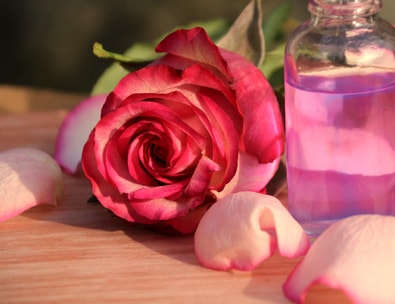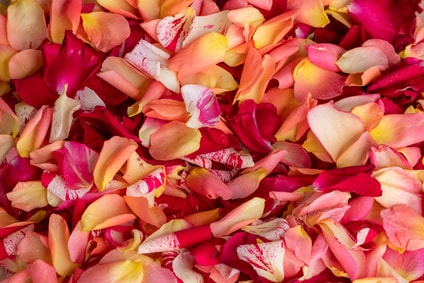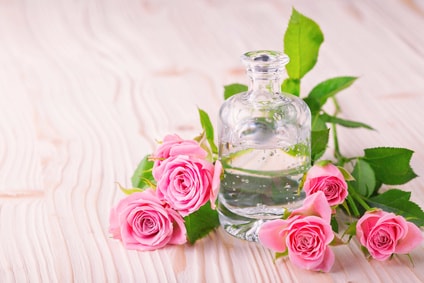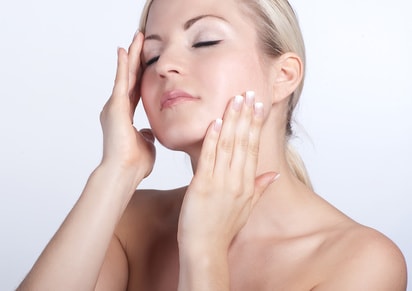Roses – they are among the most beautiful and fragrant plants worldwide. But their graceful appearance hides even more than many suspect. The rosewater and its ingredients, which are actually extracted as a by-product, are a real blessing for the skin. Even the ancient peoples knew the broad spectrum of effects of rose water. The Persians, for example, used distilled water from rose blossoms for the aroma in their dishes. In ancient Egypt, rose water was used for medicinal purposes and in beauty care.
 In late antiquity, rose water really gained in popularity and reached as far as India via the Silk Road and as far as Central Europe via Turkey. Here the Persian luxury product was sold at high prices. Rose water is traditionally produced in Morocco, India, Lebanon, Oman and Iran, among other places. In Bulgaria lies the “Valley of Roses”, the largest cultivation region in Europe.
In late antiquity, rose water really gained in popularity and reached as far as India via the Silk Road and as far as Central Europe via Turkey. Here the Persian luxury product was sold at high prices. Rose water is traditionally produced in Morocco, India, Lebanon, Oman and Iran, among other places. In Bulgaria lies the “Valley of Roses”, the largest cultivation region in Europe.
The enchanting plants with their great scent are an integral part of English gardens. This is another reason why rose water is often used in natural cosmetics. Even healing effects are said to be attributed to the little water, which has advanced by trend product.
Rose water – what is it and how is it produced?
Rose water is actually a by-product, which is obtained during the distillation of rose oil from rose blossoms. This produces an essential water, also known as rose hydrolate.
It takes about four tons of rose blossoms to produce one liter of rose oil. No wonder that not only rose oil but also rose water is so precious. The production by means of steam distillation is considered to be particularly gentle and produces rose water in organic quality. This preserves the natural substances and allows them to unfold their full effect during use.
The rose – already used in Egypt for flower essences
The ancient Egyptians extracted flower essences by distillation as early as 3,500 BC. There is some evidence of the use of the Egyptian rose, famous for its intense fragrance. In Egypt it was used for aromatherapy, where it was used against infections. The rose was also used in beauty care. For the Egyptians, the scent of the rose was sacred and therefore they also scattered roses in the burial chambers of their kings.
In the production of exquisite scents from plants, the Egyptians were true masters; in the ancient world, perfumes were considered the most expensive. At that time, the essences were filled in artistically designed bottles. The fragrances were only used by the upper classes, but regardless of wealth and status, everyone used aromatic oils to protect themselves from the heat. But especially in ancient Egypt beauty was of central importance – so perfume bottles were sometimes also a reward for the working population. It is also believed that Cleopatra covered her entire palace and especially her bedroom with roses. Since the rose had a special status, it is naturally assumed that she also used the water from roses for her beauty care.
The rose in Persia
The fragrant water from roses is naturally produced in different countries. However, it gained fame in Iran in late antiquity. In ancient Persia, rose blossoms are picked from early May to mid-June and then used to make rose water. In Qamsar, Barzak and Niasar are the major centres of rose water production. One of the most famous cities for rose water production is Kashan, where you can find rose water ampoules and dried rose blossoms in numerous shops.
The Damascus Rose
 In Syria and also in Iran the “Rose of Damascus” is very widespread. The queen among roses is also cultivated in many other countries. Actually, the name “Rosa Damascena” is somewhat misleading, because it originally comes from the Sasanid Empire in Persia. However, Damascus never belonged to the Persian Empire and the rose was never domesticated in Damascus. It is still unclear today how it got its name, because Damascus is located in the Mediterranean region. The possible areas of origin of the Damascus Rose, however, are far away from Europe. However, it is assumed that rose petals, rose oil and also rose water came to Europe via Damascus and that is why the rose got its name.
In Syria and also in Iran the “Rose of Damascus” is very widespread. The queen among roses is also cultivated in many other countries. Actually, the name “Rosa Damascena” is somewhat misleading, because it originally comes from the Sasanid Empire in Persia. However, Damascus never belonged to the Persian Empire and the rose was never domesticated in Damascus. It is still unclear today how it got its name, because Damascus is located in the Mediterranean region. The possible areas of origin of the Damascus Rose, however, are far away from Europe. However, it is assumed that rose petals, rose oil and also rose water came to Europe via Damascus and that is why the rose got its name.
Effect of rose water and its ingredients
Rose water contains numerous high-quality ingredients such as antioxidants, vitamins, tannins and vegetable fibres. The ingredients are said to have antibacterial, anti-inflammatory, decongestant, moisturising and vitalising properties. Rose water is also considered to be well tolerated. Read more here: Ingredients and effect of rose water
Possible applications of rose water in cosmetics
The application possibilities of rose water are very versatile in the cosmetic field. It is suitable for face, body and also hair care.
Face care with rose water
Most often rose water is used as a facial tonic. It is sprayed onto the face or applied to the skin with a cotton pad. Rose water is suitable for all skin types.
Rose water for body care
Rose water is not only good for the face, on hot summer days it can also be used as a refreshing body spray. Due to the rather high price it should be diluted with distilled water.
Treat your hair with rose water
Rose water can also be used to care for the hair and gives it more shine. Dry, brittle hair is moisturized thanks to rose water, and dandruff as well as itchy and greasy scalp can be combated.
Rose water in aromatherapy
The scent of rose water has a harmonizing and relaxing effect, which is why it is also used in aromatherapy. It is recommended to use it in a fragrance lamp or in a diffuser.
Read more here: Possible applications in cosmetics
Other possible applications for rose water
In addition to its use in cosmetics, rose water can also be used in other ways.
Rose water for health
Because of its ingredients, rose water is said to have a positive effect on health. In naturopathy it is used as a support for
- Headache
- Flickering eyes
- Gingivitis
- Insomnia
- Depressions
- Diarrhoea
in the field.
Rose water in the kitchen
In Iran, India and Turkey, rose water is traditionally added to a wide variety of dishes and drinks, giving an oriental touch to sweet dishes in particular. Read more here: Further possible applications
The advantages and disadvantages of rose water at a glance
| Advantages | Disadvantages |
|
|
Buy rose water
When buying rose water, you should always pay attention to excellent quality. This applies regardless of whether it is used for external or internal applications.
Manufacturer of rose water
Rose water is offered by various manufacturers. Among the best known are:
- Poppy Austin
- Pure Manufacture
- The Star Rider
- Fysio
- Vitus Organic
- Rosense
- Neatly
Read on here: Buy rose water
These rosewater products are available
Rose water is very versatile, individual products differ mainly in their intended use.
A distinction is made between the following product types:
- biological rose water
- Rose water as medicine
- Rose water as facial toner
- Rose water as toner
- Rose water in moisturizer
Organic rose water
 Organic rose water is particularly suitable for use as food. It is 100 percent pure, has food quality and is also certified organic. Since it contains no additives whatsoever, it has a limited shelf life. It should be used up after a few weeks or months due to the lack of alcoholic ingredients.
Organic rose water is particularly suitable for use as food. It is 100 percent pure, has food quality and is also certified organic. Since it contains no additives whatsoever, it has a limited shelf life. It should be used up after a few weeks or months due to the lack of alcoholic ingredients.
Rose water as medicine
Rose water is often used in naturopathy as a medical remedy. It is suitable for both internal and external use and can provide more relaxation and thus have a positive effect on the relief of headaches. It is also often used to treat inflammations (e.g. due to eczema). It can also help to detoxify the body. Food-grade rose water is also used in natural medicine, although here too the shelf life is quite short.
Rose water as facial toner
 Rose water is considered to be very well tolerated by the skin and is therefore well suited for facial care. It can provide the skin with moisture and due to its antibacterial effect it can cleanse in a mild way. However, the waters available on the market are often mixed with alcohol or perfume, which is why they are no longer pure natural rose water. These products can quickly dry out the skin. It is also advisable to use natural rose water for facial care.
Rose water is considered to be very well tolerated by the skin and is therefore well suited for facial care. It can provide the skin with moisture and due to its antibacterial effect it can cleanse in a mild way. However, the waters available on the market are often mixed with alcohol or perfume, which is why they are no longer pure natural rose water. These products can quickly dry out the skin. It is also advisable to use natural rose water for facial care.
Rose water as toner
Rose water is often used as a toner and is therefore applied after facial cleansing and before applying skin care creams. However, such products are usually not pure rose water, as other raw materials are added to it. Toners are less liquid in their consistency. But pure rose water can also be applied on the skin. However, toners with rose water are no substitute for moisturizers.
Moisturizing creams with rose water
Rose water is also often used as an additive in moisturizing creams. After cleansing and applying a toner, the skin is provided with additional moisture and thus protected from drying out. A moisturizer with rose water becomes refreshing and makes the skin soft and smooth.
Conclusion
In the field of “Beauty” rose water is becoming more and more popular and meanwhile many well-known brands and manufacturers distribute the fragrant and versatile water made from rose petals. No matter if beauty or kitchen – you can’t do much wrong with rose water.
